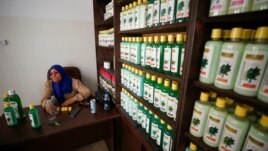02 August 2021
For years, Palestinian farmers have exported special plants to Europe. Those plants, or herbs, are turned into high-priced cosmetics and beauty products.
Now, however, a group of Gaza women have brought that process home. They are processing the herbs themselves and creating personal care products such as shampoo for the hair and moisturizer for the skin. The products are now sold in 50 stores in the area.

Refqa Al-Hamalawi, chairman of the board of the Najd Development Forum sits in her office in Gaza City July 28, 2021. (REUTERS/Mohammed Salem)
This project operates from a factory in Gaza City. All four employees are women. They use steam to draw out, or extract, oils from the herbs. The oils are the main ingredient used to make the beauty and personal care products. The herbs they use include ones you would use for cooking: rosemary, basil, mint, thyme, and chamomile. All the herbs come from farms run by women.
"When you hold the product, you feel like you are taking something from the earth - with no additives," Refqa Al-Hamalawi told Reuters news agency.
The project currently makes 17 different products, including cleansers and body wash. They sell them under the name "GG." The letters stand for "Green Gold." That is what the farmers of northern Gaza call mint.
"As women, we (are) proud of the idea and the production, an idea like in European countries," Hamalawi said.
The project is aimed at empowering women and helping the economy. It is supported financially by Australia and the global aid organization Oxfam.
While the project is small, the women involved say it has already begun to make a difference in Gaza. The unemployment rate in the territory is around 50 percent. Female unemployment is higher at 62 percent. These numbers come from the Palestinian Central Bureau of Statistics.
Dawlat Marouf is 55 years old and the mother of 12 children. She said that before she started working with the project, she struggled to make a living selling her mint and thyme in local markets. Now, she says she "wakes up every day at 5 a.m. to come to the field and prepare 40-50 (kilograms) ordered by the factory."
Marouf's daughter-in-law is named Ekhlas. She said she did not know herbs had uses outside of cooking. The project, she said, will provide "...income for our children and our families."
Narmin Al-Banna is a pharmacist who sells the products at her store. She said she likes "...these products because they are natural and have no chemicals in them." She said she tried them on many people, and many customers, and they gave her great feedback.
I'm Anna Matteo.
Nidal al-Mughrabi reported this story for Reuters. Anna Matteo adapted it for VOA Learning English. Mario Ritter, Jr. was the editor.
_____________________________________________________
Words in This Story
cosmetic –n. a substance that is put on the face or body to improve appearance
moisturizer –n. a substance used on the skin to keep the skin from drying out
ingredient –n. one of several materials used to make a kind of food
additive –n. something added to something else
proud –adj. to be pleased with something about something you have done, something you own or people you are connected with
customer –n. someone who buys goods or services from a business
feedback –n. helpful information or criticism that is give to someone for the purpose of improving performance or a product